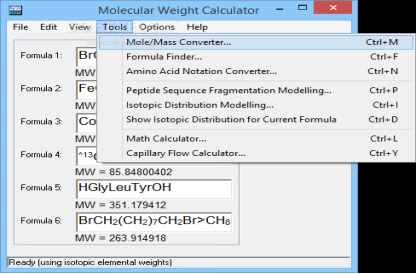What to Know About Molecular Weight
Molecular weight is a measure of the total amount of atomic weight values of any atom present in a molecule. In chemistry, molecular weight is used in determining the stoichiometry present in all chemical equations and reactions. It is usually abbreviated as MW or M.W. The unit of molecular weight is usually expressed as Daltons (Da), atomic units (AMU) or no unit at all.
Molecular mass, molar mass, and molecular weight are usually used interchangeably in a lot of places especially science and chemistry-related areas that trying to tell one from another isn’t that much help. When it comes to other areas of science, there are more ways to distinguish one from the other and very important as well.
Molecular mass is usually used during reference to the mass of one or a specific well-detailed molecule and is used a lot less than molecular weight as this is used to reference an average weight of any sample. Generally, the molecular mass of a tiny to a more medium molecule is measured by made spectrometry and they can be used to determine all element composition in a molecule.
There are molecular masses of macromolecules example are proteins that can be determined by mass spectrometry as well. Light scattering or viscosity methods are used in determining the molecular mass in a situation where mass spectrometry data crystallographic are unavailable.
Molecular weight and atomic weight are proximate to the mass of isotope carbon 12 which is given the value of 12 atomic units (AMU). Carbon, for example, is a mixture of the isotopes of carbon which is why it has an atomic weight if not precisely 12.
Molecular Mass Calculations
Molecular masses are mostly calculated from aromatic masses of present nuclides in the molecule. Molar masses, on the other hand, are calculated from the atomic weights of individual elements. The most acceptable normal occurrence is when the standard atomic weight takes a record of the distribution of isotope of an element on an individual sample.
Both molecular mass values and relative atomic values ate thought to be more dimensionless to other values. There are a lot more complexities in calculating molecular weight and that can get confusing from time to time. This is why online molecular weight calculators were created to make the process a lot easier.
There are different ways of determining molecular weight and they include;
- Hydrodynamic method
- Mass spectrometry
- Static light scattering.
These steps explain all the ways in which a molecular weight can be calculated and what to expect as well. A molecular weight calculator lets you pick the choices you have to make your answers a lot more accurate. Fortunately for you, there are a lot of ways in which you can get or use a molecular weight calculator.
Molecular weight calculators are another step to quick calculation and imputing without the stress and hassle of having to use a physical calculator or your pen and notebook. They also provide you with accurate answers every time and you do not have to worry about problems of an error. A molecular weight calculator is a step closer to better chemistry equations.


